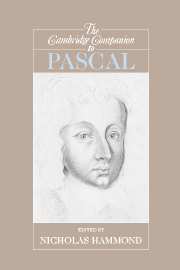Book contents
- Frontmatter
- Introduction
- 1 Pascal’s life and times
- 2 Pascal’s reading and the inheritance of Montaigne and Descartes
- 3 Pascal’s work on probability
- 4 Pascal and decision theory
- 5 Pascal’s physics
- 6 Pascal’s philosophy of science
- 7 Pascal’s theory of knowledge
- 8 Grace and religious belief in Pascal
- 9 Pascal and holy writ
- 10 Pascal’s Lettres provinciales
- 11 Pascal and the social world
- 12 Pascal and philosophical method
- 13 Pascal’s Pensées and the art of persuasion
- 14 The reception of Pascal’s Pensées in the seventeenth and eighteenth centuries
- Bibliography
- Index
Introduction
Published online by Cambridge University Press: 28 May 2006
- Frontmatter
- Introduction
- 1 Pascal’s life and times
- 2 Pascal’s reading and the inheritance of Montaigne and Descartes
- 3 Pascal’s work on probability
- 4 Pascal and decision theory
- 5 Pascal’s physics
- 6 Pascal’s philosophy of science
- 7 Pascal’s theory of knowledge
- 8 Grace and religious belief in Pascal
- 9 Pascal and holy writ
- 10 Pascal’s Lettres provinciales
- 11 Pascal and the social world
- 12 Pascal and philosophical method
- 13 Pascal’s Pensées and the art of persuasion
- 14 The reception of Pascal’s Pensées in the seventeenth and eighteenth centuries
- Bibliography
- Index
Summary
The principles of pleasure are not firm and steadfast. They are different for everyone, and vary in each particular, with such diversity that there is no one more unlike another than themselves at different periods.
(De l’esprit géométrique, OC ii, 174)Pascal is a name familiar to students and scholars in an astonishingly wide range of disciplines. Mathematicians recognise him through Pascal's Triangle or Pascal's calculating machine (which itself gave its name to a computer language). Physicists and historians of science (as well as those in technological fields) acknowledge his pioneering work on the vacuum. The word jesuitical owes its pejorative sense exclusively to Pascal's blistering satirical attack on the Society of Jesus in his Provincial Letters. Students of philosophy and theology know him through Pascal's famous Wager, which itself forms part of one of the most renowned pieces of religious apologetics, the Pensées. Even early forms of train-spotter (or, rather, coach-spotter) have cause to be grateful to him for helping to set up the first public transport system in Paris. It is a sobering thought that he achieved all this, having suffered from years of ill health, before the age of 39, when he died.
- Type
- Chapter
- Information
- The Cambridge Companion to Pascal , pp. 1 - 3Publisher: Cambridge University PressPrint publication year: 2003
- 2
- Cited by



